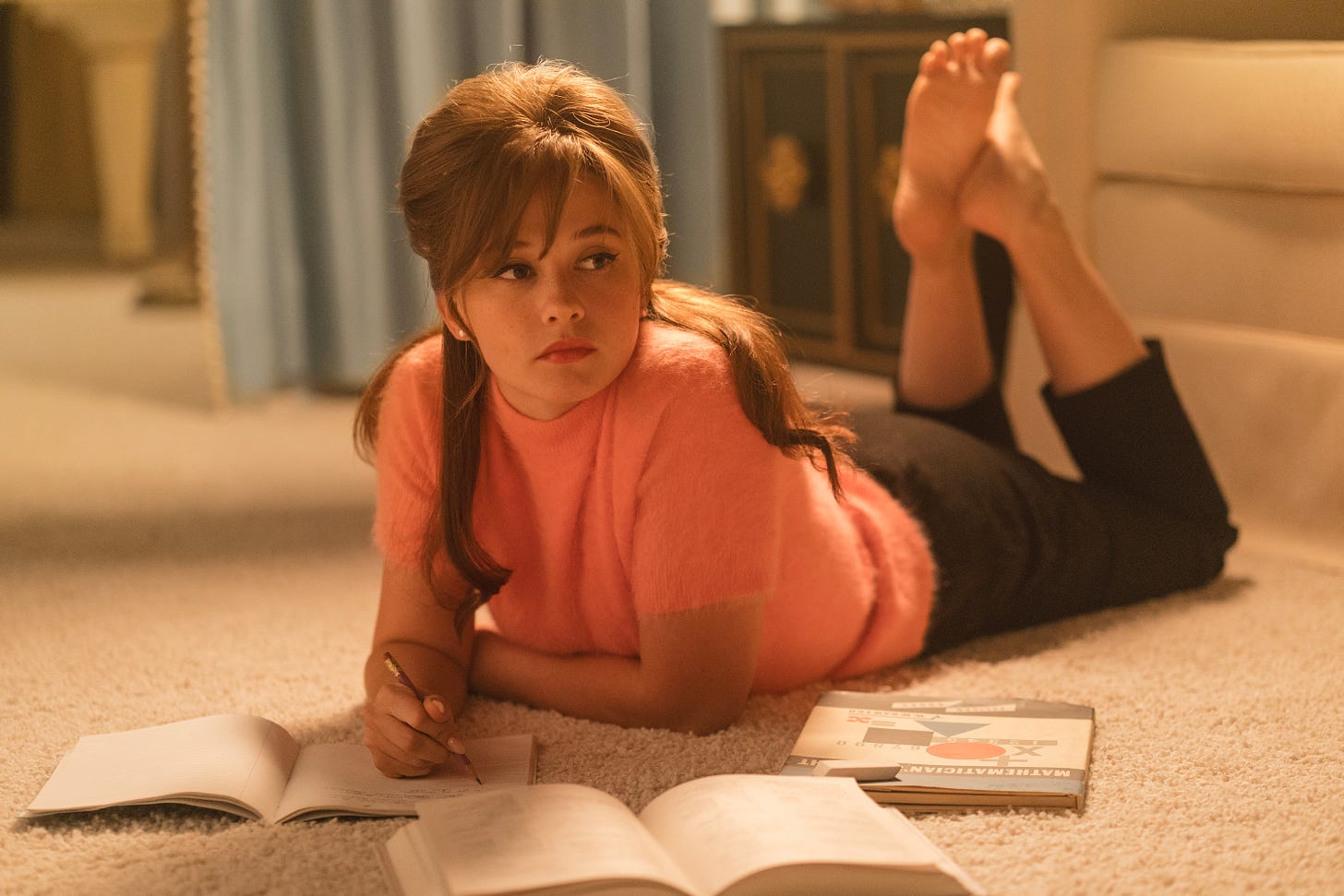Priscilla
Sofia Coppola finds beauty in small things.
It’s a common observation that Sofia Coppola makes movies about girls trapped in gilded cages. This isn’t untrue, strictly speaking, but it isn’t entirely accurate either. Sofia Coppola makes movies about small women who find themselves in places that are so much bigger than they are, with almost no hope for them to be able to find their way out. Kirsten Dunst’s Marie in Marie Antoinette remains a little girl long after she becomes queen of France, cosseted with shoes and frills and sweets. Charlotte (Scarlett Johansson) in Lost in Translation can’t yet decide who she is in the world, and she has no frame of reference in Tokyo. The teenagers in The Bling Ring think they’re getting away with literal robbery, but their escapades will forever brand them with all the notoriety of the celebrity they crave with no dividends to show for it, not even the luxury goods they’ve stolen. Priscilla is a natural fit for Coppola’s storytelling instincts, a new peak in her thematic exploration of women, small things, and the circumstances that push them to the margins.
Priscilla (Cailee Spaeny) is a teenage girl when we—and Elvis (Jacob Elordi)—first meet her. Coppola takes advantage of Spaeny’s tiny stature to startling effect. When we first see her, she’s seated with her back to the camera at the bar in an officers’ club, her hair up in bangs and a ponytail, drinking a Coke bottle through a straw. She looks like an ordinary all-American teenage girl, complete with the loneliness and the bobby socks, an unusual sight on the military base in Germany where her family has recently moved. Coppola keeps reminding us how young Priscilla is; we see her sprawled out on her bed doing homework with a pencil no less than three times. When she and Elvis first meet at a party, he probes for her age by asking whether she’s a junior or a senior. (She’s in ninth grade, and she tells him so.) We suspect their age difference from the conversation, but Coppola punctuates that difference wordlessly by framing the two of them side-by-side. The first time we see Elvis and Priscilla standing up next to each other, the difference in stature is breathtaking. Elvis appears to be twice Priscilla’s height. Coppola never lets us forget about the differences in age, physicality, and emotions between the two.
Priscilla tries to grow up too fast; Elvis would rather not grow up at all. He’s larger than life, an overgrown boy himself, surrounded by other boys who like to roughhouse and shoot fireworks at each other. Even at this early stage in his career, he’s trying to hang on to youth. When he leaves the Army—and Germany, and fourteen-year-old Priscilla—Elvis asks her the impossible: “Promise me you’ll stay the way you are now?” Priscilla agrees, and throughout the rest of the film’s runtime, she shapes herself into the girl that Elvis idealizes: dark hair, dark eyes, dressed in blue, always small, always waiting for the return of “her” man from his adventures away.
The film’s portrayal of their relationship is chaste almost to the point of coyness. Coppola refuses to exploit Priscilla; she was a child when she first met Elvis, and the power differential between the two never grew into a healthy, mature relationship. Coppola’s camera never leers, and despite the worried whispers of Priscilla’s parents or the gossipy stares of her classmates, the film never feels sordid. Instead, it’s a delicate tragedy, told almost entirely through Priscilla’s own eyes. We get the rose-colored infatuation of her youth, and the realization that things don’t need to be this way, so slow that the change is almost imperceptible.
Coppola frames the slippage of time through swift montages of objects. When Priscilla waits for Elvis the first time, it’s a series of calendar pages and Christmas cards and gifts, girlish tchotchkes giving way imperceptibly to the outward signs of early womanhood, a heart-shaped locket traded for a pearl necklace. Coppola smartly tracks time with ephemera, emphasizing the fleeting nature of youth and the keepsakes used to try to preserve that feeling. Most of the girlish things come across as old-fashioned now; today’s youth culture is tomorrow’s pile of outdated junk. Crucially, none of Priscilla’s ephemera feels tacky when it’s on screen. We’re so firmly entrenched in Priscilla’s point of view that the symbols of youth and vitality feel fresh and exciting, until suddenly Priscilla realizes that she is all alone in Graceland: a stifling house when there’s no one to share it with. The tchotchkes have been replaced by tall, grim walls and heavy drapes, blocking out the light.
Priscilla isn’t about Priscilla Presley as a victim; it’s about the woman excavating her personhood from underneath a suffocating cultural force. For so long she is practically dormant, because she was a child when she met Elvis and she spent so much of her youth shaping herself to meet his desires without stopping to consider what she wanted. Coppola finds the person that Priscilla hasn’t managed to become yet, whether she’s alone at the dinner table or out shooting pistols with Elvis and his friends at Graceland. Whenever Elvis is in the room, he’s magnetic, but he’s that way because Priscilla feels that way; as the two grow older and grow apart, he’s colder, more aloof, until we can’t really see his face any more. The glamour of the stage makes him unknowable.
The beauty of Priscilla is in its sensitivity and nuance. There’s genuine love here, albeit bent out of shape and warped by the differences in power and age between Priscilla and Elvis. Such a relationship cannot leave either party unscathed. Still, there’s grace in the small things—the tchotchkes, the girls, and Priscilla herself. —Sarah Welch-Larson
★★★★
Priscilla is in wide release this weekend.



